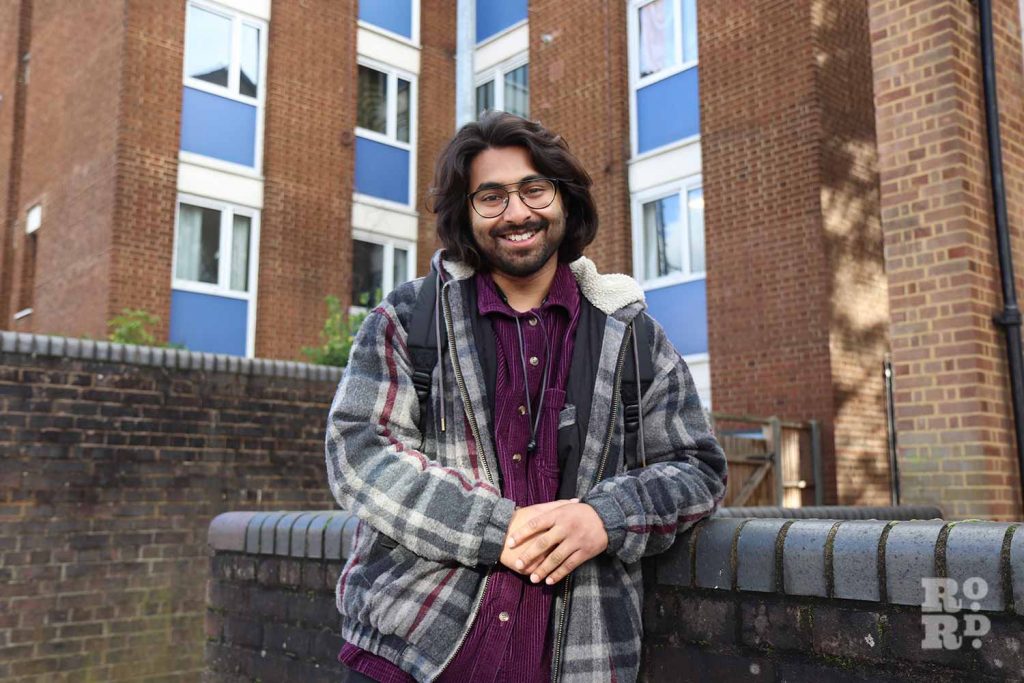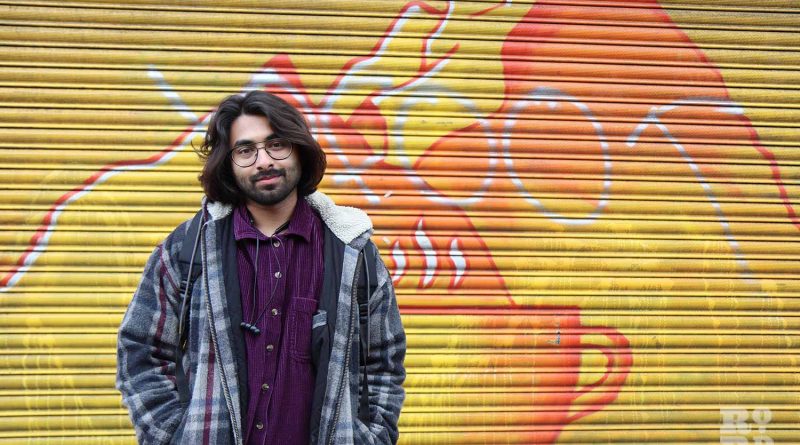Iftikhar Latif on swapping his Oxford law degree for East End poetry slams
Iftikhar Latif, the eldest son of working-class Bangladeshi immigrants, grew up on Lanfranc Estate in Mile End. With a reputation as the smartest kid in the class with a penchant for public storytelling, he went on to study law at Oxford as the first in his family to go to university.
But eventually, he would find himself eschewing the traditional immigrant success story to write his own prose (or more accurately, poetry) in the bars and cafes of east London’s poetry scene.
Latif already has a self-published poetry collection from 2018 entitled ‘Losers’, with a cover of an illustrated version of his face holding up an ‘L’ to his forehead. He co-founded a locally successful poetry night, Off the Chest, held monthly at Hiland Cafe on Roman Road, before switching to digital platforms during the pandemic.
‘I definitely miss the sweatiness of live poetry nights,’ he says. ‘It’s quite personal to have the audience being all crammed together in a small venue. There won’t be any of that for a while.’
We meet outside in the crisp autumn air by Victoria Park as inside meetings are restricted under coronavirus restrictions, a day before the whole of England entered into a second lockdown.
Latif has been working on a series of poems over lockdown that he published on his website.
These poems are a dissection of his multifaceted identity, parts of which often conflict with each other.
Perhaps the best example is the eponymously titled PFC (Perfect Fried Chicken), the fried chicken shops that dot the East End. After all, the sight of schoolchildren congregating around the PFC by Mile End station is a familiar sight to many of us. And not too long ago, Latif was one of them.
The poem goes,
‘as proper as i tried to be
oxford educated, articulate and cultured
oh boy did i struggle quitting
those greasy hot wings
housed in neon lit pfcs…’
‘The British Bangladeshi community here is quite tight knit,’ he says. ‘So you don’t realise how you and all your friends have the same view on a lot of things, like music or outlook on life.
Latif is friendly and easy-going, often pausing before answering questions in fully formed thoughts, speaking in a neutral, received pronunciation that hardly gives away an east London accent, if he ever had one.
An A* student at Swanlea School in Whitechapel, he arrived at Oxford to study law, but found himself in a much bigger pond.
‘It was strange because I realised that it’s a very different experience being a big fish in a small pond. At school there I was almost always the top of my class and then I got to Oxford and realised I wasn’t the only clever student.’
But at university, he came to a realisation about how privilege operates in the real world.
‘Before I had the attitude of, “if you work hard enough you get what you want.” I came to realise that wasn’t true. In reality there are structural barriers.’
‘I was surrounded by Etonians or people from really wealthy families and they were all getting these internships and it isn’t the same for you. So I think when I graduated from university I had a different outlook on life.’
At this point, Latif had a difficult challenge ahead of him. How does he tell his working-class, immigrant parents, that he no longer wanted to have the financially stable, conventional career that they had dreamt for him?
‘I had studied law because, like in many immigrant families, law is one of these professional, vocational qualifications that are seen as being ‘safe’, in terms of getting a job with good income.’
But after experiencing first hand how social and economic privilege offers opportunities for those who possess those privileges, and puts up barriers for those without, he had become disaffected with corporate city life.
‘The next step would have been to further my law studies and get a job as a solicitor or something but I didn’t want to do that. I was just rethinking what I wanted to do, and the answer was I wanted to do something creative with people I actually liked.’
So he took a job working for an Itsu branch in Oxford Street, where he worked for a year, while he continued to work out what he wanted to do with his life.
But he was tearing up the narrative that he had created for himself as the kid from the East End who would get out of the ‘ends’; the first in his family to go to university who was going to be a successful lawyer and make his family proud. That was an enormously difficult task for Latif.
It was during this challenging year that he discovered his love for writing and performing poetry.
‘It was difficult because my parents didn’t understand where I was coming from, when I told them I didn’t want to work in law.’
‘And as for me, I was just shredding the plan I had for myself in my head, and starting all over again.’
Despite those worries, he started writing.
His first self-published poetry collection, Losers, came out of the experiences of this challenging year. Latif says it wasn’t necessarily about being a ‘loser’ in the traditional sense.
‘It’s more about that sense of loss of my own experiences, of having to tear up my previous notions of who I thought I was.’
Aided by his circle of friends, some of whom he had met during live poetry nights across London, he went on to launch his book Losers at Hiland Cafe.
‘The staff knew my face because I would work on my writing there all the time. So I had my book launch there.’
Latif seemed to have emerged from the proverbial storm, having realised his determination to be a poet.
He soon found himself a stable nine-to-five job in publishing, and in his spare time, he would host his own poetry night, Off the Chest, which was held monthly at Hiland Cafe.
Even now, having been relegated to the online world, Off the Chest is steadily growing, having recently celebrated their one year anniversary via an event on Zoom.
In the meantime, Latif is exploring different facets of his identity through his poetry.
‘When I first started I was mainly writing about how sad I was. Now I’m also thinking there are also these other things going on, like how I’m British Bangladeshi and how I come from East London but went to a really posh university.’
His latest poems include more of a conscious, active engagement with the intersecting topics of race, culture and masculinity.
‘I don’t think you can divorce masculinity from culture,’ he says.
There is a poem ‘Old Man’, about his father, whom he very much admires as a paragon of fatherly resilience and stoicism.
However, Asian notions of masculinity also has its downsides, which Latif explores in that poem.
‘Men don’t have to be strong all the time. Like if my dad ever had an issue, would he ever speak about it?’
At the moment, he is working on exploring his identity through his poetry, as well as other issues that tend to fill up the heads of twenty-somethings, such as dating and feelings of pandemic-induced ennui.
For the future, Latif will continue to co-host Off the Chest, and explore topics in his poetry that are unique to him.
‘I want to write more about British Asian identities, and brown parenthood. Not that I want to say all of Asian culture is bad, but it is about exploring issues that are specific to different communities.’
It becomes clear from our conversation that the job of figuring out oneself, and who we are, is a lifelong one.
Poetry offers a vehicle to do just that. And no doubt, the themes Latif touches on his poetry, of feeling lost, of negotiating and renegotiating his identity, will be relatable to many people, by British Bangladeshi kids from the East End and beyond.
If you liked this article, you might also enjoy reading about local photographer Rehan Jamil, about growing up in a rapidly changing East End.



